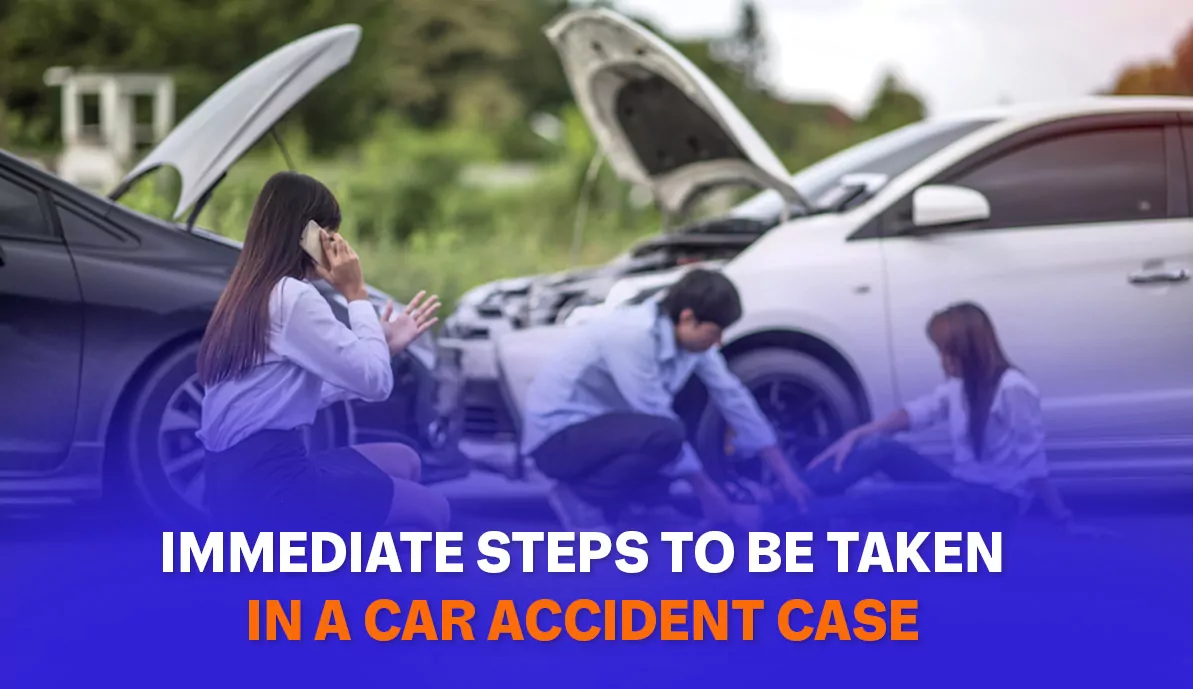Car accidents can be stressful and traumatic. It is essential to take the proper steps to ensure you receive the medical attention you need and that your rights are protected. Following these steps can help you build a strong case and increase your chances of receiving fair compensation for any damages or injuries you may have sustained.
Stay Calm and Assess the Situation
Adrenaline can be a powerful hormone that can cloud your judgment, so take a few deep breaths and focus on the immediate task. Do not move your vehicle unless blocking traffic or posing a hazard. If your car is still operational, turn on your hazard lights. If it is not safe to move your vehicle, stay inside your car with your seat belt fastened and wait for emergency services to arrive.
Call for Emergency Assistance
In the event of any injury to you or anyone else, dial 911 right away.If there are no apparent injuries, call the police to report the accident as a precaution.
When you call 911, tell the operator your location and that there’s been a car accident. If anyone requires medical attention, let the operator know so they can dispatch an ambulance. Provide as much detail about the accident as possible, including how many vehicles are involved, the direction of travel, and any hazards on the roadway.
When emergency services arrive, cooperate with them, and answer any questions they may have. They might ask if you or anyone else has any injuries or if there are any hazards in the area.When in doubt, seek clarification.
Exchange information with the other driver(s)
This exchange includes their name, address, insurance information, and driver’s license number. Also, write down the make and model of their vehicle, license plate number, and the location of the accident.
Avoid discussing fault or blame for the accident with the other driver. Also, do not apologize or admit guilt, it can hurt your chances of being fairly compensated if the case goes to court.
If the other driver is uncooperative or refuses to give you their information, wait for the police to arrive. They will take down the information for you and ensure the other driver follows proper protocol.
Gather Evidence at the Scene
Take pictures and video of the accident scene, including damage to the vehicles, any hazards on the roadway, the surrounding area,
and any injuries sustained. This data will be valuable evidence if you need to pursue legal action.
If during your car accident, there were witnesses do not hesitate to get their names, phone numbers, and addresses. They may be able to provide valuable testimony on your behalf if the case goes to court.
Make sure to collect the police report of the accident. This report includes details about the accident, such as the time, location, and the officer’s opinion on who was at fault. The police report can be evidence in court.
Notify Your Insurance Company
After a car accident, one of the first things you need to do is notify your insurance company. Your policy will likely cover certain damages, such as property damage and medical bills. Your insurance company will assign an adjuster to investigate and evaluate the damages.
Review your policy to understand what it covers and what the limits are. Some insurance policies have deductibles. You might have to pay a certain amount out of pocket before your insurance covers the rest.
When you speak to the insurance adjuster, stick to the facts and avoid admitting fault. Provide the adjuster with the necessary information, such as your contact information and the date and location of the accident.
Seek Medical Attention
Even if you do not think you are injured, seek medical attention after a car accident. Some injuries, such as whiplash or concussions, may not show symptoms until days or weeks later.
A medical professional can evaluate your injuries and provide necessary treatment.
Documenting your injuries can also be helpful for your insurance claim and potential legal case.
Keep track of all medical bills, doctor’s notes, and any other documentation related to your injuries. Record visible bodily damage by taking photos of injuries like bruises or cuts.
Consult with an Experienced Car Accident Attorney
Consulting with an experienced Orlando Car Accident Attorney can help you understand your legal options and protect your rights. An Orlando Personal Injury Attorney has the experience to guide you through the legal process and negotiate your claim with insurance companies. They can also advise you on the best action for your unique situation.
Preserve Your Rights and Document Everything
Preserving your rights and documenting everything related to the accident can help protect your claim and potential legal case.
There are designated time limits set by each state for filing claims for damages. Understanding the timeline in your state, and taking action before the deadline is crucial and something your Orlando Car Accident Attorney can guide you through.
Keep track of all damages, including medical bills, property damage, and lost wages. Take photos of any damage to your vehicle or personal property.
Final Thoughts
Following these immediate steps after a car accident can help ensure that you are prepared and backed by an Orlando Car Accident Attorney if you need to pursue legal action. Seek advice from an Orlando Personal Injury Attorney to further guide you after gathering the necessary evidence.
The steps outlined in this article can assist you in making sure your rights are protected, thus setting yourself up for success in your case. If you have any concerns or questions, an Orlando Car Accident Attorney will assist you in every step of your case. Remember, taking prompt action can make all the difference when achieving a favorable outcome.



